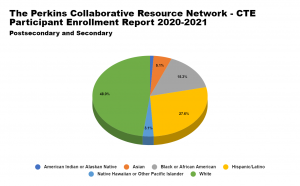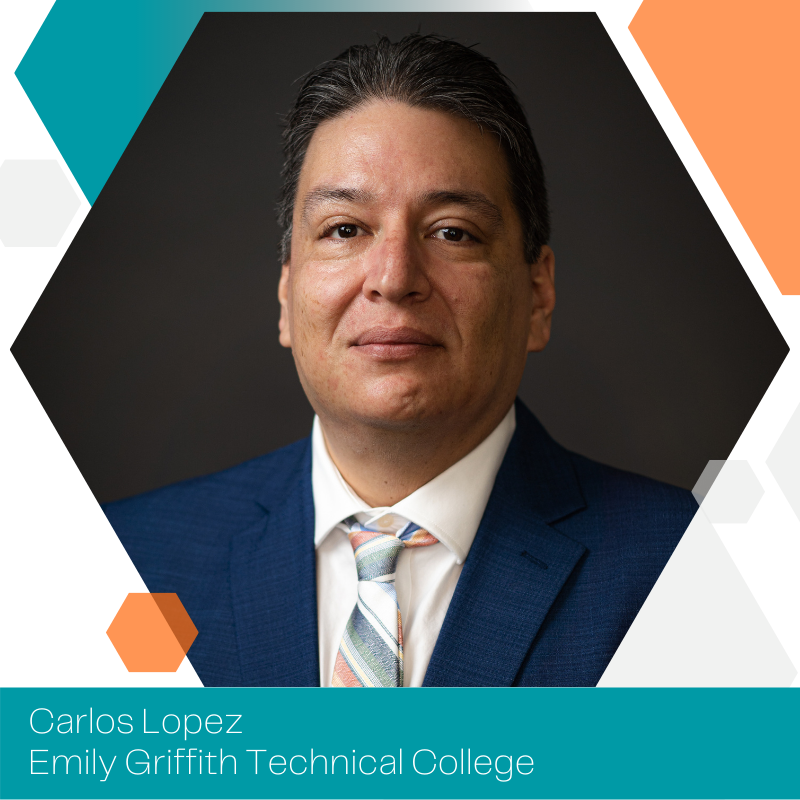This is the second in a series of four blogs about the Postsecondary State Career Technical Education Leaders Fellowship at Advance CTE – Sponsored by ECMC Foundation and offers a review of several states’ Career Technical Education (CTE) leadership training initiatives and current efforts to diversify the pool of qualified candidates, specific to racial diversity.
In the first blog of this series, Advancing Equity in CTE: Making the Case for Diverse Leadership Pipelines in Career Technical Education, we shared data that highlighted the increase of diversity of learners in CTE programs and in comparison, the reality that state CTE leadership has remained mostly White, with approximately 13 percent of State CTE Directors identifying as non-White. As we seek to achieve a more demographically representative state CTE leadership, as called for in Without Limits: A Shared Vision for the Future of Career Technical Education (CTE Without Limits), this blog reviews the state of the CTE leadership pipeline in three states – Pennsylvania, Texas and Ohio. These states can both serve as exemplars and a starting point to evaluate the needs of state CTE systems to create more robust and diverse talent pipelines.
Overview
The current state of CTE leadership training programs vary based on state requirements to become a CTE administrator and how states and organizations without certification or licensure requirements decide to offer training opportunities. As of 2017 only 16 states require CTE administrators to attain a certification or licensure to teach at the secondary level. In the postsecondary space, the number of institutions of higher learning offering coursework specific to administrating and leading a CTE program are consistently declining; just nine states offer formal preparation programs 1. Administrative training for CTE is increasingly being offered in the form of mentorship programs, contracted hybrid virtual training typically modules, conference workshops or training academies offered by state CTE agencies and CTE affiliated organizations.
 Pennsylvania
Pennsylvania
The state offers leadership training through centers supported by the Pennsylvania Department of Education (PDE) at three sites, the state’s eastern site is located at Temple University, the central site is located at Penn State University and the western site is located at Indiana University of Pennsylvania. The programs offer a CTE Director’s Certificate for grades 7-12 which can be completed in two years and a Master of Education degree option in a virtual setting with a window of completion of two to three years. Additional or alternative training in the form of mentorship programs and conference workshops is also available through the Pennsylvania Department of Education Bureau of Career and Technical Education (BCTE) and the Pennsylvania Association for Career and Technical Administrators (PACTA). These efforts are bolstered by the requirement as mandated by the Pennsylvania Legislature and facilitated through the PA Inspired Leadership (PIL) Program for a CTE administrator to complete a certification process, Praxis Series School Leaders Licensure Assessment. A recent effort to establish CTE leadership standards is the development of a set of knowledge and skill core competencies (KSCC) resulting from the triangulated research conducted at Penn State University 2. The core competencies addressed are:
- Workforce Education Management
- Curriculum and Instructional Leadership in Workforce Education
- Fiscal and Facilities Management
- Ethical Issues in Workforce Education
- Administering Personnel Services
- History and Philosophy of Workforce Education
- The Law and Education
To date, the PDE has requested alignment between the research-developed KSCCs and the CTE Director Certificate offered in Pennsylvania.
 Texas
Texas
Secondary CTE administrator training in Texas is offered by the Texas Education Agency (TEA) and the Career & Technical Association of Texas (CTAT). The New CTE Administrator and Counselor Sessions, professional training modules provided to local education agencies by the TEA at no cost, focuses on preparing administrators to develop CTE systems aligned to the state’s college, career and military readiness (CCMR) standards ensuring access and equity in CTE programming. The NextGen Administrators, training designed for mid-level administrators such as CTE coordinators, specialists and instructional coaches with less than five years of experience, is a virtual option offered by CTAT with aspiring leaders meeting on a monthly basis for 13 months. The program explicitly lists as session topics Terminology and Best Practices in Cultural Diversity and Differentiated Instruction for Special Populations. The state agency no cost training was provided through the use of the state’s Carl D. Perkins Act leadership funds.
 Ohio
Ohio
The Ohio Association for Career and Technical Education supports CTE administrators for secondary and postsecondary leadership through the Byrl R. Shoemaker CTE Institute. A one-year hybrid program which includes beginning and ending with a legislative seminar, site visits to secondary LEAs and local higher education institutions, conference attendance, networking opportunities with local and state leaders and the completion of a team project.
Diversification of the CTE Talent Pipeline
While the states reviewed do not specifically outline a process to recruit diverse aspiring CTE administrators, leadership pipeline training opportunities are accessible and prominently featured on state and CTE support organizations’ websites. As identified in the first blog of this series and in alignment with CTE Without Limits Principle 2, the nation’s rapidly changing demographics create a sense of urgency related to the intentional recruitment of diverse leaders into the currently limited administrator pipelines available to CTE professionals.
In the next blog in this series, we will explore how state CTE leaders can (and why they should) lead with an equity lens. To learn more about the need for equity in CTE, visit Making Good on the Promise: Understanding the Equity Challenge in CTE in the Advance CTE Resource Center.
Read the full blog series
Blog 3: Advancing Equity in CTE: The Equity-Minded Leadership Framework
Blog 4: Advancing Equity in CTE: Administrative Policy Review – An Assessment of Equitable Practices
Dr. Kevin Johnson, Sr., Senior Advisor




 After struggling academically as an undergraduate at a liberal arts college and unsure of his future, Karl Ohrn joined the United States Air Force, ultimately serving 30 years. It was in the Air Force that Karl had his first exposure to Career Technical Education (CTE).
After struggling academically as an undergraduate at a liberal arts college and unsure of his future, Karl Ohrn joined the United States Air Force, ultimately serving 30 years. It was in the Air Force that Karl had his first exposure to Career Technical Education (CTE). Caleb Perriton’s career began in the automotive industry as an international trainer prior to entering the world of postsecondary CTE. Currently, he serves as Program Director of the Trades & Technical Studies Pathway at Laramie County Community College. He is an ASE Certified Master Automotive Technician and earned a bachelor’s degree in automotive technology from Weber State University and master’s degree in business administration from the University of Wyoming.
Caleb Perriton’s career began in the automotive industry as an international trainer prior to entering the world of postsecondary CTE. Currently, he serves as Program Director of the Trades & Technical Studies Pathway at Laramie County Community College. He is an ASE Certified Master Automotive Technician and earned a bachelor’s degree in automotive technology from Weber State University and master’s degree in business administration from the University of Wyoming.  Dr. Luv’Tesha Robertson
Dr. Luv’Tesha Robertson  Daniel Sandoval is passionate about cultivating self-reliance among learners and students from marginalized populations and has focused on serving immigrant, economically disadvantaged, racially underrepresented and linguistically diverse communities. His range of experience includes grant writing and administration, managing apprenticeship and credential attainment initiatives, and serving in leadership roles in postsecondary student services. Currently, Sandoval serves as the Director of Customized Training and Apprenticeships at Pickens Technical College and as a Psychology instructor at the Community College of Aurora. He earned a bachelor’s degree in English writing from Colorado Mesa University and a master’s degree in counseling psychology from the University of Colorado at Denver.
Daniel Sandoval is passionate about cultivating self-reliance among learners and students from marginalized populations and has focused on serving immigrant, economically disadvantaged, racially underrepresented and linguistically diverse communities. His range of experience includes grant writing and administration, managing apprenticeship and credential attainment initiatives, and serving in leadership roles in postsecondary student services. Currently, Sandoval serves as the Director of Customized Training and Apprenticeships at Pickens Technical College and as a Psychology instructor at the Community College of Aurora. He earned a bachelor’s degree in English writing from Colorado Mesa University and a master’s degree in counseling psychology from the University of Colorado at Denver.  Milo path to finding his career passion began with experiences that we hope for all Career Technical Education (CTE) learners —- career exploration, robust high school CTE classes and work-based learning that led to a decades-long passion for education and providing more opportunities for students.
Milo path to finding his career passion began with experiences that we hope for all Career Technical Education (CTE) learners —- career exploration, robust high school CTE classes and work-based learning that led to a decades-long passion for education and providing more opportunities for students. Carlos Lopez (Colorado) has over a decade of experience as an instructor, program coordinator and academic advisor at secondary and postsecondary institutions focused on historically marginalized learners. Carlos currently serves as the Associate Dean for the College of Health Sciences and Administration at Emily Griffith Technical College. They earned a bachelor’s degree in Psychology from Metropolitan State University of Denver and master’s degrees in Liberal Arts and Education Leadership and Policy Studies, Higher Education from St. John’s College – Santa Fe and University of Texas – San Antonio, respectively.
Carlos Lopez (Colorado) has over a decade of experience as an instructor, program coordinator and academic advisor at secondary and postsecondary institutions focused on historically marginalized learners. Carlos currently serves as the Associate Dean for the College of Health Sciences and Administration at Emily Griffith Technical College. They earned a bachelor’s degree in Psychology from Metropolitan State University of Denver and master’s degrees in Liberal Arts and Education Leadership and Policy Studies, Higher Education from St. John’s College – Santa Fe and University of Texas – San Antonio, respectively. Curtis Scales (Arkansas) began his career in management training in the healthcare industry and translated his passion for wellness and supporting underserved populations into a career in education. He currently serves as the Program Manager for Special Populations at the Arkansas Department of Education. He earned a bachelor’s degree in Recreation Administration from the University of Arkansas, and master’s degrees in Management and Leadership and Human Resource Management from Webster University.
Curtis Scales (Arkansas) began his career in management training in the healthcare industry and translated his passion for wellness and supporting underserved populations into a career in education. He currently serves as the Program Manager for Special Populations at the Arkansas Department of Education. He earned a bachelor’s degree in Recreation Administration from the University of Arkansas, and master’s degrees in Management and Leadership and Human Resource Management from Webster University. Dr. Dimitria Harding (Minnesota) has over 15 years of experience in the CTE field working as a cytotechnologist before pursuing a career in higher education. Dr. Harding currently serves as a Dean of Health Sciences and Career and Technical Education at Minnesota State College. She received a bachelor’s degree in Health Science and a master’s degree in Community Health from Old Dominion University, and a doctorate in Organizational Leadership.
Dr. Dimitria Harding (Minnesota) has over 15 years of experience in the CTE field working as a cytotechnologist before pursuing a career in higher education. Dr. Harding currently serves as a Dean of Health Sciences and Career and Technical Education at Minnesota State College. She received a bachelor’s degree in Health Science and a master’s degree in Community Health from Old Dominion University, and a doctorate in Organizational Leadership.